 |
|
Rescuers are seen on the cruise ship Eastern Star that capsized late on Monday in the Jianli section of the Yangtze River in central China's Hubei Province, June 3, 2015. Rescuers have only found 14 survivors, and so far have retrieved 26 bodies, leaving over 400 people still unaccounted for. [Photo/Xinhua] |
Rescue teams continue using all measures possible to rescue anyone still alive on the Eastern Star, the cruise ship carrying 456 people that capsized in Yangtze River on Monday evening. News update show 14 people have been saved and the whole nation prays the number will miraculously rise.
Among those that survived was the captain, and he has been receiving a lot of vitriol from the public. Many netizens blame the captain, 52-year-old Zhang Shunwen, for having survived while passengers and crew members died; some have said he should be charged, while some asked why he did not follow the example of Lee Joon-seok, the captain of the South Korean ferry MV Sewol that overturned last April with the loss of 304 lives, who committed suicide after being sentenced to 36 years in prison for negligence.
Such comments are irrational when the cause of the accident is still not yet known. From the information available, blaming the captain for the disaster is jumping to a conclusion without evidence.
It seems a lot more likely that it was a freak accident as a result of the weather. The China Meteorological Administration confirmed that a severe storm, with force 12 winds, hit that part of the river. Local residents said that they had never seen anything like it.
There is no modern code that requires a captain go down with the ship in the event of an accident, although he or she is expected to do all that is possible to safeguard the lives of those onboard. Of course, some captains that survive the loss of their vessel deserve blame and punishment, because they put the lives of passengers at risk through their actions. Duty and honor require the captain of a ship to organize the evacuation of passengers before leaving the vessel. The above-mentioned South Korean captain Lee was blamed and found guilty by the court because he failed to organize the abandoning of the vessel during the two hours that it took the ship to turn over. As a result, only four of the 44 life boats were used; had they all been put into use more lives would have been saved.
However, in the case of the Eastern Star, eye-witness accounts show the vessel capsized within minutes. Zhang Hui, a 43-year-old male survivor, recounted how he managed to escape by grabbing a life-vest and jumped out of a window as the ship leaned over. It was impossible for anybody, the captain included, to organize an effective rescue within such a short period of time. The captain is being questioned by police, but no charges have been brought against him.
While it is too soon to condemn the captain, it is also too soon to purge him of all responsibility, as hours before the accident, the Eastern Star was tied up in the harbor of Chibi, Hubei province, with another cruise ship, they followed the same route but the other captain decided to stay there for night because of the weather forecast. Zhang made a different decision and tragedy struck.
Why he made such a decision is unknown. Zhang has 35-year experience, and his colleagues said he is honored almost every year. What prompted him to continue the trip after forecast of bad weather?
No conclusion about responsibility and accountability can be made until a full investigation is completed. It is too early for the court of public opinion to condemn Zhang.
Hopefully, now that the immediate shock of the tragedy has faded people will consider twice before rushing to make rash judgments.
The author is a writer with China Daily. [email protected]

I’ve lived in China for quite a considerable time including my graduate school years, travelled and worked in a few cities and still choose my destination taking into consideration the density of smog or PM2.5 particulate matter in the region.